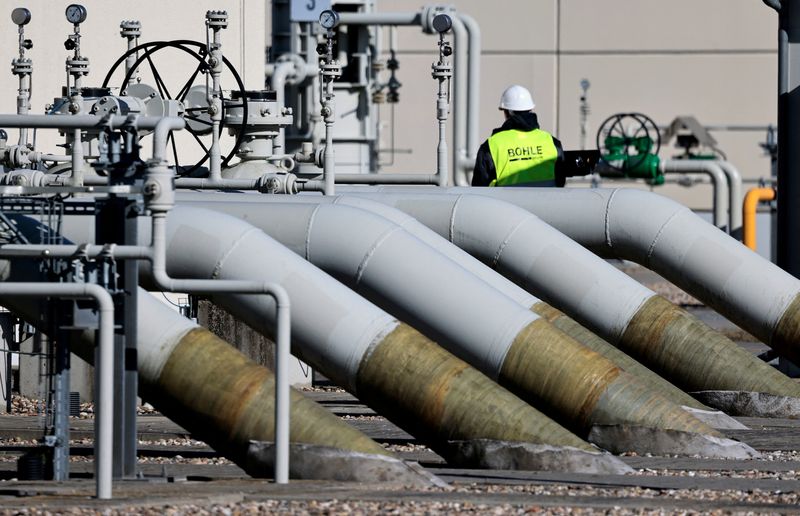(Bloomberg) -- Commodities opened Monday on steadier footing after last week’s turmoil, but investors face a daunting slate of immediate risks -- from a European gas crisis to fresh Covid-19 flare-ups in China and fears of a global economic slowdown.
Germany must get ready for more cuts to gas supplies as Russia’s “economic warfare” against Europe intensifies, German Economy Minister Robert Habeck warned. Gas traders and consumers are watching how governments in Europe prepare. Energy policy is also center-stage in the US, after President Joe Biden’s comments on gasoline triggered a weekend Twitter spat with billionaire Jeff Bezos.
Energy crises and central bank moves to crush inflation present powerful headwinds for demand, underscored by copper’s plunge below $8,000 a ton. Minutes of the last Federal Reserve meeting due Wednesday should give more detail on the bank’s thinking as forecasts for a US recession multiply. And investors will, once again, be tracking coronavirus case counts in China after outbreaks across key manufacturing hubs.
Nothing But Trouble
European gas and power markets are in turmoil and the energy crisis has barely begun. The single biggest risk in coming weeks is that the Nord Stream pipeline -- Europe’s key channel for gas from Russia -- is not restarted after 10 days of maintenance that begin July 11. But regardless of the outcome there, Europe’s politicians are under intense pressure to act immediately and stave off the worst of the looming crisis.
The focus remains on heavy consumer Germany, which already raised its gas risk level to the second-highest “alarm” phase, tightening monitoring of the market and rebooting some coal-fired power plants. Across the continent, expect unprecedented intervention in energy and power markets. That could include everything from moves to ration demand to shoring up alternative supplies and bailing out struggling utilities.
Manic Metals
If copper really is a barometer of the world economy, we should be getting worried. The metal used in electrical wiring tumbled below $8,000 a ton for the first time since early 2021. The gathering drumbeat of warnings about a global recession is weighing on all metals, and the latest virus news from China casts some doubt on one potential bright spot for demand.
China is racing to quash outbreaks across the Yangtze River Delta region that’s both a powerhouse of the economy and a base for many copper-intensive industries. The news of more virus woes also put iron ore under fresh pressure on Monday, with the steelmaking material slumping below $110 a ton. Goldman Sachs Group Inc. analysts said persistent, positive news from China’s economy would be needed to “break the bear market” for metals. That maybe just got postponed.
Balancing Act
Oil notched its first monthly drop since November on fears of a global downturn, but despite that the supply situation remains tight. The two big questions hanging over the market are whether OPEC+ can ramp up production any further after completing the return of supplies halted during the pandemic, and whether demand destruction will kick in. President Joe Biden will be hoping for a resounding yes to the first question when he visits the Middle East later this month, but there’s skepticism that the Saudis can pump at higher rates for an extended period.
See also: Can Saudi Aramco Meet Its Oil Production Promises?: Javier Blas
Saudi Aramco will likely release its official selling prices for August soon, which will provide an indication on its outlook. Refiners and traders surveyed by Bloomberg are expecting another increase. In the US, the extent to which Americans jump in their cars and hit the highways over the long Independence Day weekend will be of interest. Gasoline demand on a four-week rolling average was already at it lowest since 2014, excluding virus-ravaged 2020, so look out for whether that demand destruction persists.
Whither Wheat
“We in grains have never traded a war market before, so this is all new,” said one trader as wheat harvests begin in the Northern Hemisphere. This month will test how much wheat can get to market with Ukraine’s supplies still severely constrained. Wheat and corn futures have returned to levels last seen before Russia’s invasion, possibly helping to tame the surge in grocery bills from Kenya to the UK and the US. The UN’s monthly snapshot of global food costs is due Thursday.
Even with the downturn, prices remain at lofty levels, straining budgets of importers and lower-income nations. Also from the UN, an annual food-security report arrives Wednesday, detailing the latest assessments of global hunger. The situation was already worsening before the war, and tens of millions more could lack enough to eat this year, the World Food Programme has warned.
Putin’s Latest Gambit
Just as Europe’s fears over Russian gas supplies reach fever pitch, the man in the Kremlin unleashed another energy surprise at the end of last week. Putin delivered a bombshell for foreign investors in Sakhalin-2, including Shell (LON:RDSa) as well as Japan’s Mitsubishi Corp. and Mitsui & Co. Rights to the project will be vested in a new Russian company, with zero compensation for those who opt out.
What exactly this means should become clearer over the course of this month. But the move threatens to complicate Shell’s efforts to sell its 27.5% stake, and casts a cloud over the future of gas supplies to Japan, which depends on Russia for about 9% of its imported LNG. Expect to hear more on how Japan might go about replacing Russian gas imports -- a task that’s made tougher because Europe is doing the same.
See also: Japan Will Struggle to Do Without Russian Energy: QuickTake
For the Diary
- Click here for oil markets
- Click here for metals markets
- Click here for gas markets
- Click here for agricultural markets
- Click here for China
©2022 Bloomberg L.P.
